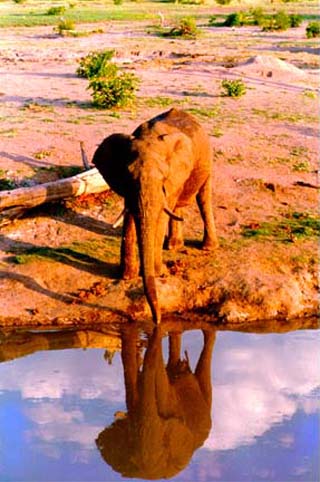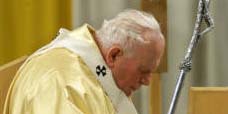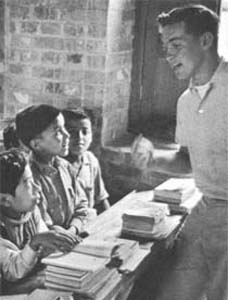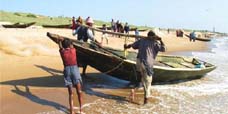
Guinea RPCV Matt Brown says: Since wresting power from the white minority, in 1980, the black Robert Mugabe has ruled the country with an increasingly iron fist
Matt Brown: Vic Falls or bust
01:00 AM EDT on Tuesday, April 12, 2005
SAN JOSE, Calif.
THE MOVIE THEATER was hot and stuffy, but I hardly noticed. I wasn't really there. I was hanging out in suburban Detroit with Eminem and Kim Basinger.
As Eminem was singing, "You gotta lose yourself in the music," I was lost in the movie 8 Mile. Yet somehow the story of a white kid growing up in a black neighborhood and trying to make it in the almost entirely black rap industry made me wistful for a home I hadn't seen in a long time.
The movie ended, the house lights went up, and it was only then that I noticed how sweltering the theater was, how badly it smelled of body odor, and how mine was the only white face in a theater packed with Zimbabweans.
Outside, the weather was not so warm. Spring had brought freezing rain to Bulawayo, Zimbabwe's second-largest city, and I bundled up to walk the streets of downtown. I was basically just killing time.
There wasn't much to see in the mainly industrial city, and yet I was stuck there. Earlier that day, I had been informed that all train service in Zimbabwe had been suspended because of a fuel shortage; the same was true of the buses. In fact, as I looked around, the streets of Bulawayo were almost devoid of traffic.
The fuel shortage was just a symptom of the greater economic crisis that had been plaguing Zimbabwe. People I met on buses and in restaurants talked of how prosperous Zimbabwe had once been, how it had been a dynamic, thriving place to live. In recent years, however, the country's economy had come to a catastrophic halt. The reason was quite simple: As one taxi driver said, "Mugabe is running this country into the ground."
Indeed, that was the sentiment on the Zimbabwe street. Since wresting power from the white minority, in 1980, the black Robert Mugabe has ruled the country with an increasingly iron fist. A Marxist, he has silenced opposition and placed strict limits on press freedom. And in 2000, Zimbabwe began a "land-reform" program that has intensified the country's economic crisis.
Zimbabwe once had a food surplus and a thriving economy based largely on the cash crops of tobacco and coffee. Most of the large commercial farms were owned by a small minority of white farmers. Then, during the land grab, the white farmers were forced to flee their farms, and their prosperous land was divided among peasant subsistence farmers. Without the income from the country's cash crops, the economy crumbled, and for the first time, Zimbabwe had to rely on foreign aid to feed its people. Inflation rose to 700 percent.
The exchange rate had the Zim dollar at 50 to 1 U.S. dollar, but the black market was offering 5,000 to 1. Entering the country via the border with South Africa, I had met a shady-looking man who said he was a money changer; for $100 U.S. he gave me four cinderblock-sized stacks of $100 Zim bills, which barely fit in my backpack. To complete the deal, he also gave me a few $5,000, $10,000, and $20,000 Zim bills.
These large denominations hadn't existed in Zimbabwe before the economic crisis. Because of rampant inflation, the government had been forced to hastily print these notes, which looked like Monopoly money. Turning over a $20,000 bill, I saw that the back side was blank, and immediately suspected that the money changer had ripped me off. However, a man on my bus assured me that the bills were legitimate; in an effort to save money, I learned, the government had printed only one side of them.
So I had more than time to kill on the Bulawayo streets; I had a backpack of nearly worthless Zimbabwe dollars, which I couldn't exchange for U.S. dollars. Hoping to spend some cash, I visited a few supermarkets, but found only aisles of bare shelves, punctuated by a few staples, such as rice and bread. It was reminiscent of stories I'd heard of the Soviet Union.
Besides the lack of goods in the stores, and the streets empty of cars, I noticed something else missing in Bulawayo. In a country with a sizable white minority, the only other white person I saw in the city was the old woman who owned the hostel where I was staying. A third-generation white Zimbabwean, she waxed nostalgic about a better time in Zimbabwe's history.
"Since the land reform," she said, "the country has gone to hell." She told me stories of friends, white farmers, who had been attacked in the middle of the night by peasants seeking to take their land.
"All the whites are scared," she said. "Most have left for Australia or the U.K. But we won't fit in there -- we are not Australian or British. We are Zimbabwean."
The woman had a point. The whites in Zimbabwe are just as African as I am American. They have been living there since British missionaries and South African Boers began moving to the region, in the 1850s. In 1923, the British granted self-rule to the white settlers of present-day Zimbabwe, then known as Southern Rhodesia, after pioneer Cecil Rhodes. Although they made up only 2 percent of the population, the whites ruled Rhodesia until Mugabe took over, in 1980.
Despite the large disparity in conditions between blacks and whites in Zimbabwe, taking land from whites who have farmed it for generations does not seem like a viable solution. If Native Americans came to power in the United States and took back large Iowa corn farms, surely people would be up in arms.
The old woman who owned the hostel told me that many white Zimbabweans had moved to Victoria Falls. Realizing that tourism at the falls is the country's biggest income producer, the government has taken great measures to ensure that this region is relatively stable. Most tourists fly directly to Vic Falls, stay long enough for a photo in front of the cascade, then fly home. This is all they see of Zimbabwe.
"My son," said the woman, "was forced off his land a year ago. Now he owns a hostel in Vic Falls." She made a reservation for me to stay at her son's hostel, and arranged for a tourist minivan to take me the six hours from Bulawayo to Vic Falls, for which I would have to pay the extortionate price of $20 U.S.
The next morning, I found myself in a van with four tourists from Mauritius. It was an overcast day, the sky the color of ash, and the countryside looked brown and withered. At one point, we must have been trailing a grain truck that either was overflowing or had a hole in it, because for a few miles a stream of corn kernels littered the roadside. As we rounded a curve, we came upon a troop of baboons that had ventured from the surrounding forest and were gathering the kernels.
A mile down the road, we came to a village. As we slowed, I could see many women and children bent low, sifting though the roadside dirt: They were collecting corn kernels in rusty metal bowls.
If I had visited Zimbabwe a decade earlier (I was told many times), I would have seen a much rosier place than the harsh country that has driven people to forage for food like baboons. Many friendly Zimbabweans, both black and white, expressed pride in their country and embarrassment that I was seeing it in its worst state.
I wished I could have offered them an easy solution to their problems. But as a traveler, that's not what I was there for. I was there to see the country, and to try to understand its problems. And to tell others about it.
Matt Brown, who recently spent two years as a Peace Corps volunteer in a village in Guinea, is studying for a master's degree in journalism at San Jose State University.
This article originally appeared in Glimpse Magazine, a Providence-based international news and features periodical, publishing cultural-experience pieces by correspondents living abroad (www.TheGlimpse.com).















